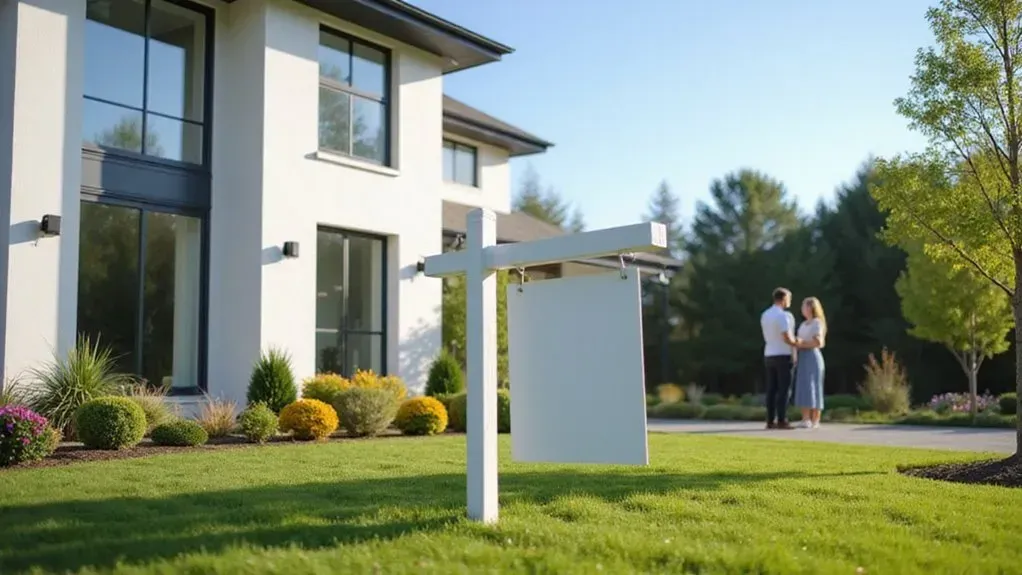
Standing at the crossroads of retirement and homeownership, reverse mortgage holders face unique challenges when selling. Many homeowners delay action until foreclosure looms, creating unnecessary stress and potential financial loss. Family members inheriting such properties often feel overwhelmed by the complex requirements. Acting decisively with proper knowledge can transform this daunting process into a manageable transaction.
To sell a house with a reverse mortgage, you must contact your lender immediately, request a payoff statement, and ensure the sale price covers the loan balance. The process requires careful timing because reverse mortgage loans become due when the borrower moves, sells, or passes away.
In this blog I will explore the entire process of selling a property encumbered by a reverse mortgage.
Key Takeaways
- Notify the lender of your intent to sell and request a payoff statement before listing the property.
- Ensure sale proceeds cover the full reverse mortgage balance to avoid default or legal issues.
- Heirs have 12 months to settle the loan, with options for extensions, and must coordinate with the lender.
- Consider quick sale options like cash buyers or Jay Primrose Properties for faster, hassle-free transactions.
- Maintain property taxes and insurance during the sale process to prevent foreclosure and legal complications.
What Is a Reverse Mortgage?

A reverse mortgage lets you convert your home equity into cash without monthly payments, but you need to understand how it works first.
There are different programs, like Home Equity Conversion Mortgages (HECMs), that are federally insured, and others that vary by lender.
Unlike traditional mortgages, you don’t pay monthly; instead, the loan is repaid when you sell, move out, or pass away.
Definition and Basic Concept
A reverse mortgage lets homeowners convert their home equity into cash without monthly payments. You retain full ownership while accessing your property’s value. The lender provides funds as a lump sum, monthly payments, or a line of credit.
The loan balance grows over time as interest accrues and fees accumulate. Repayment happens when you sell your home, move out permanently, or pass away.
This financial product provides a non-recourse guarantee, protecting your heirs from owing more than your home’s value. Furthermore, your age and property value determine how much you can borrow.
Types of Reverse Mortgage Programs
Three main reverse mortgage programs exist in the US market today. The Home Equity Conversion Mortgage (HECM) is federally insured and most popular. HECMs have standardized terms and FHA insurance protection.
Proprietary reverse mortgages serve homeowners with higher-value properties. These private loans often allow larger amounts but may have different fee structures.
In addition, single-purpose reverse mortgages help seniors with specific financial needs like property taxes or home repairs. These loans typically have lower costs.
As a result, your home value and financial goals will determine which program fits your situation best.
How Reverse Mortgages Differ from Traditional Mortgages
Reverse mortgages operate opposite to traditional mortgages in payment structure and purpose. Homeowners 62+ can access their home equity without making monthly payments.
Borrowers keep their home while receiving funds based on age, property value, and current interest rates.
The loan only becomes due when you sell your home, permanently move out, or pass away.
These loans are non-recourse, meaning you never owe more than your home’s value. However, you must continue paying property taxes and homeowners insurance.
Furthermore, understanding lender qualifications and repayment options helps you make sound financial decisions.
Most importantly, reverse mortgages serve specific retirement needs that traditional loans can’t address.
Can You Sell a House with a Reverse Mortgage?

Yes, you can sell a house with a reverse mortgage anytime without penalties. The process requires working with your lender to settle the loan balance from the sale proceeds. Any extra money goes to you or your heirs afterward.
The selling process follows five main steps. First, notify your lender about your intention to sell.
Then request a payoff statement showing your current loan balance. Next, sell your property through normal channels. After closing, use the proceeds to pay off the reverse mortgage completely.
Finally, keep any surplus funds if the sale price exceeds your loan balance. However, you’ll need to cover any shortage if the sale doesn’t cover the full amount.
What Happens When You Sell with a Reverse Mortgage?

When you sell your home with a reverse mortgage, you must repay the entire loan balance before anything else.
Make sure your sale price covers the loan, or you’ll need approval for a short sale or other arrangements.
Act quickly—once the home sells, the settlement process starts, and delays can cause costly complications.
Loan Repayment Requirements
Yes, selling a home with a reverse mortgage requires immediate loan repayment. You must settle the loan before transferring ownership to a new buyer.
Contact your lender to request a payoff quote as your first step. Getting a current home appraisal will help determine its market value. Sale proceeds must cover the outstanding loan balance.
If underwater, you may need to negotiate with your lender. As a result, planning ahead is essential.
Heirs have the option to pay 95% of the appraised value to satisfy the debt This provides a potential solution for families. Take action early to protect your loved ones from financial stress.
Equity Considerations
Your home equity after selling with a reverse mortgage depends on the sale price versus loan balance. Any funds remaining after repaying the loan belong to you or your heirs.
The non-recourse feature protects you from owing more than your home’s value. This means you’ll never face personal liability if the home sells below the loan amount.
If your sale price exceeds the loan balance, you keep the surplus. When they equal each other, no equity remains. If the loan exceeds the sale price, you owe nothing extra. This protection offers peace of mind throughout the reverse mortgage process.
Timeline for Settlement
Heirs have 12 months to settle a reverse mortgage after the homeowner’s death.
The initial period is six months, with two possible 90-day extensions available. You must notify the lender immediately about the death. An appraisal determines the property’s current value for sale or payoff purposes. The settlement process requires quick action to meet all deadlines.
Failure to follow the timeline can trigger foreclosure proceedings. Confirm all payoff amounts with the lender before finalizing any sale. During this period, maintain property taxes and insurance payments to avoid complications. Moreover, the lender can provide specific guidance for your situation.
How to Sell a House with a Reverse Mortgage?
You need to notify your lender as soon as you decide to sell, so they can provide a payoff quote and guide you through the process.
Next, arrange for a property appraisal to determine its current value, which directly impacts the sale and loan repayment.
Finally, ensure the reverse mortgage is paid off from the sale proceeds, and understand what happens if there’s any excess or shortfall.
Contacting Your Lender
You must contact your lender before selling a home with a reverse mortgage. Request a payoff quote to understand your exact loan balance. This gives you clarity on financial obligations.
The reverse mortgage servicer needs to know about your sale plans immediately. Inquire about potential prepayment penalties that could affect your proceeds.
The final payoff amount must be verified before closing the sale. Maintain open communication with your lender throughout the process. This approach prevents delays and unexpected issues during the sale.
In addition, ask for all necessary documentation requirements. Your lender can guide you through specific steps for your situation.
Property Appraisal Process
A property appraisal determines your home’s market value when selling with a reverse mortgage. This valuation directly impacts how much you can receive from the sale.
Reverse mortgage appraisals must meet specific requirements regarding property condition and comparable sales data.
Property tax issues should be resolved before the appraisal begins. Early resolution prevents complications during the selling process. Furthermore, addressing these concerns promptly helps ensure a smooth transaction.
The appraiser will evaluate your home’s condition, location, and recent sales of similar properties.
In most cases, maintaining good property condition positively influences the final valuation.
Paying Off the Loan Balance
You must pay the reverse mortgage loan when selling your home. Contact your lender immediately for a payoff quote. Sale proceeds must fully cover the outstanding loan balance. Prepare to get lender approval if the sale amount falls short.
Work with agents who understand reverse mortgage sales. They can help navigate lender requirements effectively. All required disclosures and counseling documentation should be complete before listing.
Furthermore, quick action prevents potential foreclosure proceedings. Your timely response protects both your property interests and family members’ future security.
Handling Excess Proceeds
Any money left after paying off your reverse mortgage belongs to you or your heirs. This provides a financial advantage when selling your home.
Contact your lender before the sale to determine the exact payoff amount. This step helps maximize your remaining funds. Proper planning prevents delays in receiving your money after closing.
Federal regulations require lenders to distribute excess proceeds within 30 days of the sale. You can request these funds be sent via check or direct deposit to your account.
What Are Your Options If Facing Negative Equity?
If your home’s value falls short of the reverse mortgage balance, you still have options to protect yourself.
You can pursue a short sale, sign over the deed, or work with family and lenders to find a solution. Acting quickly is crucial to avoid foreclosure and minimize financial loss.
Short Sale Possibilities
Yes, a short sale is possible with a reverse mortgage. Lenders may approve selling your home for less than the loan balance when you have negative equity. This option can help avoid foreclosure.
First, get your home appraised to determine its current market value. You must show financial hardship to strengthen your case. Next, contact your lender to begin negotiations.
Reverse mortgage borrowers benefit from non-recourse protection, meaning you won’t owe more than the home sells for.
Working with a real estate agent who understands reverse mortgages improves your chances of success. The lender’s approval is essential before proceeding with any sale.
Deed in Lieu of Foreclosure
A deed in lieu of foreclosure transfers your home to the lender instead of going through foreclosure. This option works when you can’t sell your home due to negative equity. You voluntarily give up ownership rights in exchange for loan forgiveness.
Lender approval is required before proceeding with this solution. The main benefit is avoiding a lengthy foreclosure process. This approach often causes less damage to your credit score than a full foreclosure.
Furthermore, this mortgage release option can provide relief from financial hardship. The process typically moves faster than traditional foreclosure. Most lenders will consider this option if you’ve tried selling first.
Family Assistance Solutions
Families have several options when facing reverse mortgage negative equity. Your loved ones can purchase the home with lender approval.
Heirs may choose to surrender the property by signing over the deed. Federal laws protect families from owing more than the home’s value through non-recourse provisions.
Estate planning strategies exist specifically for reverse mortgage situations. Professional financial advice can reveal the best path for your family’s circumstances.
Time matters in these situations. Quick action protects family assets and reduces stress during an already difficult period. Each family’s situation requires a unique approach to resolve mortgage issues effectively.
Lender Negotiations
Lenders may accept negotiated solutions when your reverse mortgage exceeds home value. Contact your lender immediately to discuss options such as a short sale. A short sale allows you to sell your home for less than the loan balance with lender approval.
You must provide financial documentation and proof of hardship during these discussions. Be prepared to explain your situation clearly.
Furthermore, understand your rights before any negotiation begins. Non-recourse protection limits your liability to the property value only, not your personal assets. This protection extends to your heirs as well.
With proper negotiation, you can resolve the situation while minimizing financial damage.
What Legal Considerations Should You Know?
You must understand your legal obligations before selling, including providing required disclosures and adhering to strict timelines.
Failing to meet HUD counseling requirements or notify your lender can lead to serious consequences, like foreclosure or legal disputes. Stay informed and act quickly to ensure a smooth sale and protect your rights.
Required Disclosures
You must disclose a reverse mortgage when selling your home. This mortgage creates a property lien that requires settlement before ownership transfer.
Notify your lender about your plans to sell. Legal requirements include providing payoff statements and revealing deed restrictions.
When selling an inherited house with a reverse mortgage, specific disclosure rules apply. Keep your HUD counseling documentation accessible throughout the process.
The consequences of hiding a reverse mortgage are serious. Lenders may initiate foreclosure proceedings against you. Additionally, legal complications can arise from non-disclosure.
Timeline Restrictions
Heirs have six months to resolve a reverse mortgage after a borrower dies. This period can be extended twice, with each extension lasting 90 days. You must sell the property or pay off the loan within this timeframe. Foreclosure proceedings may begin if deadlines aren’t met.
Furthermore, quick action protects your family’s interests and honors your loved one’s legacy. The lender must follow legal notification procedures when the loan matures.
Federal regulations govern these timelines, which start from the date of death certification.
HUD Counseling Requirements
Reverse mortgage applicants must complete HUD-approved counseling before proceeding. Federal law requires this step to protect seniors from making uninformed decisions. The process involves meeting with an authorized counselor who explains all aspects of reverse mortgages. You’ll discuss potential risks, alternatives, and financial implications during your session.
Your counselor provides a Certificate of Completion after reviewing everything thoroughly. This certificate remains valid for six months. Many lenders won’t even accept your application without this document. The counseling typically costs between $125-$200, though fee waivers exist for low-income applicants.
Need to Sell Your Reverse Mortgaged Home Fast?
If you need to sell your reverse-mortgaged home quickly, consider cash sales for a faster closing and fewer delays.
Make sure you gather all necessary documents, like the payoff quote and title info, to avoid hold-ups.
Working with an experienced agent and streamlining the process can help you move swiftly and avoid costly setbacks.
Benefits of Cash Sales
Cash sales offer the fastest way to resolve a reverse mortgage situation. They eliminate financing delays and simplify the entire transaction process.
A cash buyer can typically close within 1-2 weeks rather than 30-45 days with traditional financing. Most cash purchases avoid lengthy appraisal processes and remove financing contingencies that often delay closings.
This speed matters when you need to settle a reverse mortgage quickly. The simplified process also reduces your risk of falling short on loan repayment. Without financing hurdles, you’ll face fewer potential deal breakers.
Furthermore, any proceeds remaining after the mortgage payoff stay with you for future needs.
Documentation Preparation
Documents must be gathered promptly to sell your reverse-mortgaged home. First, collect your payoff quote to know the exact loan balance.
Title documents verify your ownership and are essential before listing. The HUD counseling certificate ensures legal compliance throughout the process. Your property records help support proper valuation during appraisal.
Lenders require specific documentation within strict timeframes to approve the sale. Additionally, having these items organized speeds up the transaction considerably.
Keep everything in a dedicated folder for quick reference. For best results, request your payoff quote just before accepting offers.
Streamlined Closing Process
The reverse mortgage closing process requires specific steps for fast sales. First, contact your lender for a payoff quote immediately. This quote shows exactly what you owe.
You must hire a real estate agent with reverse mortgage expertise to navigate legal requirements.
Prepare your home by completing essential repairs quickly. Active marketing helps attract potential buyers faster. Before finalizing any sale, double-check all payoff details with your lender.
The Home Equity Conversion Mortgage (HECM) process has strict timelines that must be followed to avoid legal complications.
Sell Your Reverse Mortgaged Home to Jay Primrose Properties Today
Jay Primrose Properties homes with reverse mortgages directly. We purchase your property quickly without the usual selling complications. Our team offers fair market value with no prepayment penalties to worry about.
You’ll benefit from our streamlined process designed specifically for reverse mortgage situations. We guide you through each step with clear explanations.
Our flexible timeline works around your needs, not ours. Furthermore, we provide solutions for reverse mortgage defaults.
Most sellers complete the entire process in under 30 days. Contact us today for immediate assistance with your reverse mortgaged property.
Frequently Asked Questions
How Do Heirs Pay off a Reverse Mortgage?
Heirs must act fast to settle a reverse mortgage by selling the home, paying off the loan with sale proceeds, or negotiating with the lender. They have up to 12 months, so prioritize prompt action to protect their interests.
What Happens if You Sell a House With a Reverse Mortgage?
When you sell a house with a reverse mortgage, you must pay off the loan before any proceeds go to you or heirs. Act quickly, notify your lender, and ensure proper settlement to avoid foreclosure and protect your interests.
Can Heirs Walk Away From a Reverse Mortgage?
Yes, heirs can walk away from a reverse mortgage, especially if the home’s value is less than the loan. Act quickly—notify the lender, consider selling or deed-in-lieu, and protect your loved ones from unnecessary debt.
Do You Have to Pay Capital Gains on a Reverse Mortgage?
You usually don’t pay capital gains on a reverse mortgage because it’s a loan, not a profit. But if you sell the home for more than your basis, you might owe taxes—consult a tax professional immediately to protect your interests.
Give us a call anytime at 253-697-0007 or fill out this quick form to get started today!
Get A Fair Cash Offer On Your House

About the author
Justin Baker
Justin Baker is the founder of Jay Primrose Properties, a leading cash home buying company based in Tacoma, WA. With a passion for real estate investing, Justin has helped numerous homeowners in the Pacific Northwest region sell their homes quickly and hassle-free. Justin believes that buying and selling real estate should be a seamless process and works tirelessly to ensure that his clients have a stress-free experience. With a deep understanding of the local real estate market and a commitment to exceptional customer service, Justin has established himself as a trusted and reliable cash home buyer in Tacoma and the surrounding areas.











